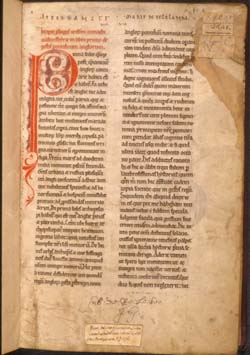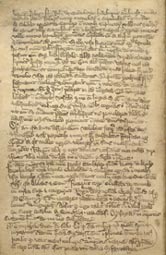 |
 |
 |
 |
 |
 |
 |
|
Byland Abbey: History
Byland Abbey: Buildings
|
Byland's library collection in the twelfth and thirteenth centuries The library at Byland probably held about two hundred books, several of which survive today. A number of these are preserved in the British Library and include Bernard of Clairvaux’s Apologia (BL MS Royal 8 F XV), letters of Pope Alexander III (BL MS Cotton Faust. B I), an anonymous Life of St Alexis (BL MS Cotton Faust. BIV), and a copy of Henry of Huntingdon’s chronicle (BL MS Cotton Cleo. B IV).(16) One rather remarkable book that belonged to Byland is a copy of the first four books of William of Malmesbury’s Gesta Pontificum (BL MS Harley 3641). It has recently been noted that Byland was the only northern house to own a copy of this in the twelfth century. The manuscript was probably a copy produced by the monks themselves to reduce expenses in leaner times.(17) Indeed, although the monks would have received books as gifts, they would have borrowed some from other religious houses and made their own copies. This would have been a cost-effective way to expand the library holdings. It has been suggested that Byland and Buildwas may have shared manuscripts.(18) Several interesting books that belonged
to Byland are the Opus Agriculture,a treatise on agriculture
(Trinity College Cambridge
MS 0 3 42) and a late-fourteenth century compilation of ghost
stories [BL Add 3180]. This was actually recorded by a monk of
Byland,
who wrote down a collection of eerie occurrences relating to
the neighbourhood. They include tales of phantom beasts, a howling
ghost and restless spirits whose misdemeanours in life prevented
their peace in death. There is also an interesting story about
a former rector of Kereby who was buried by the chapter-house
at
Byland, but whose body was later dug up and thrown in the water.(19) |

